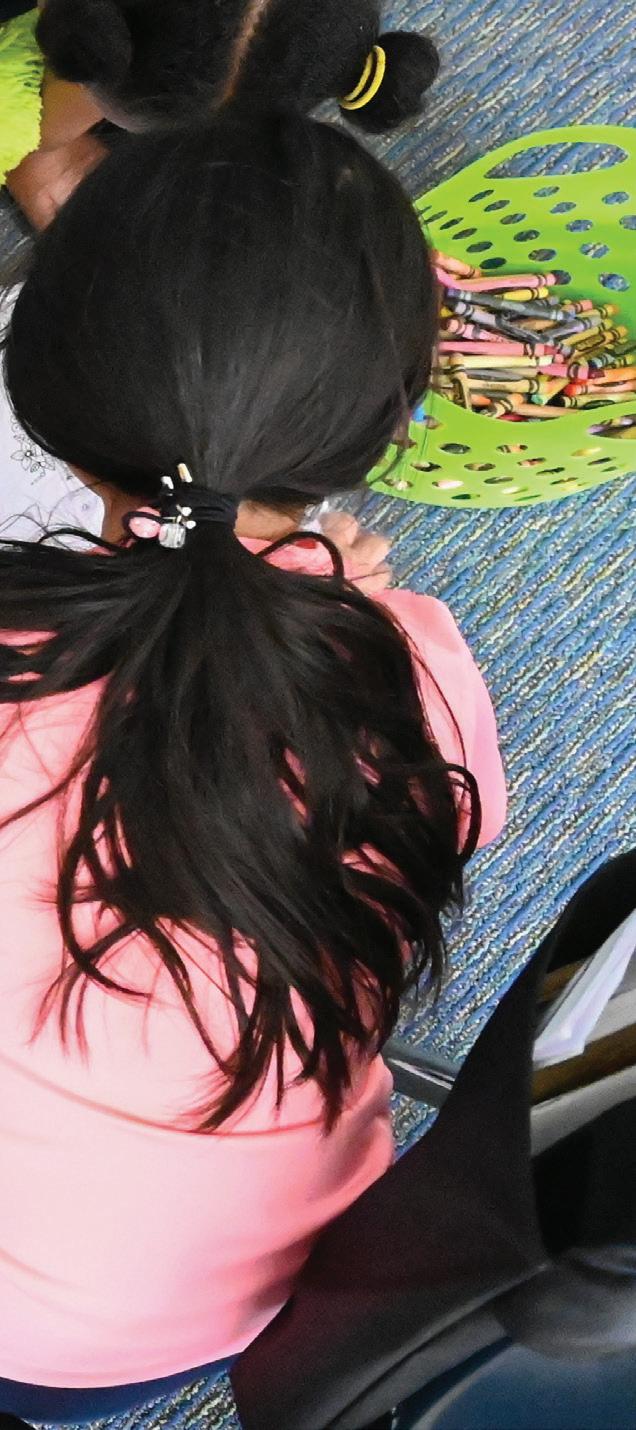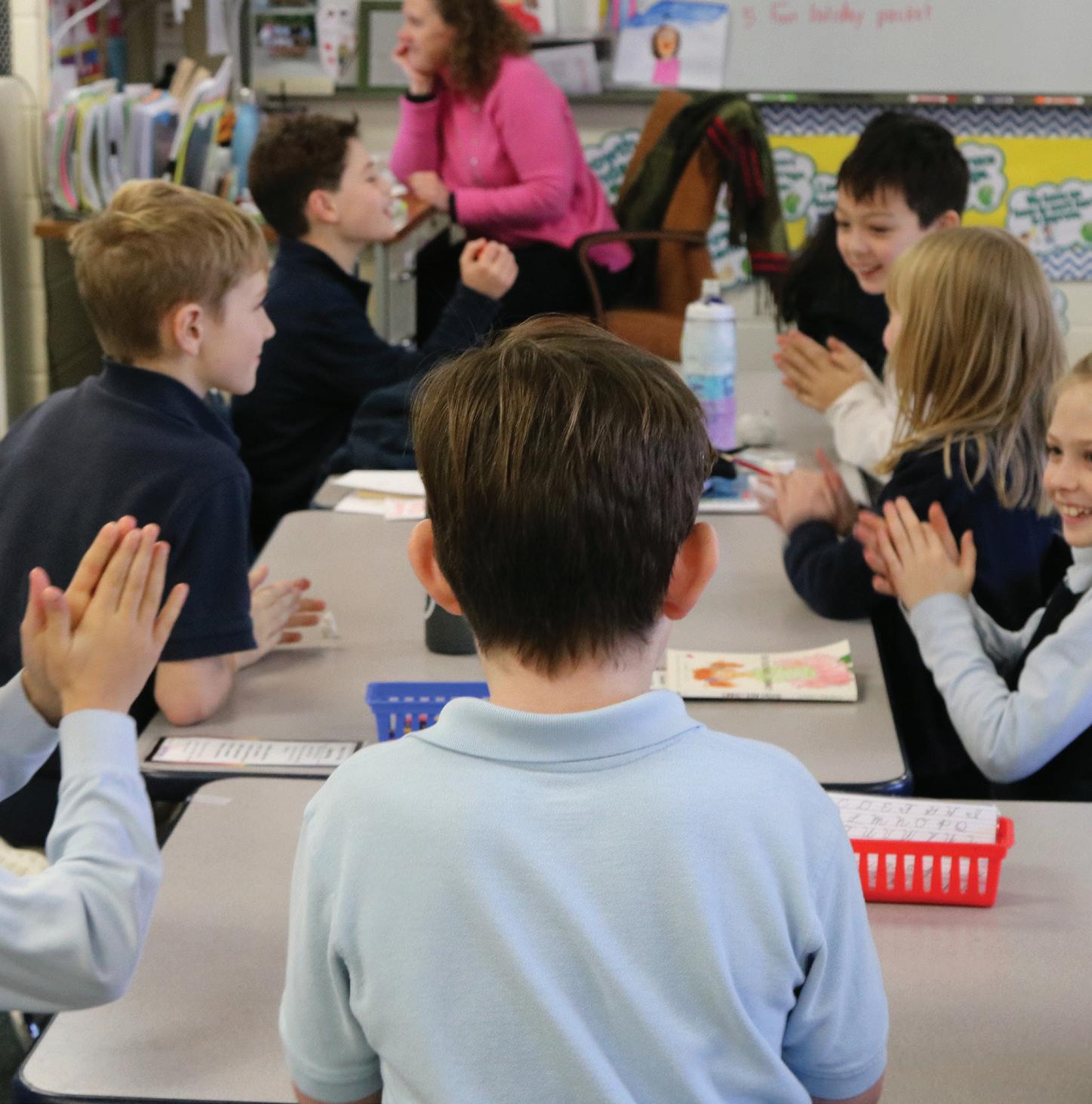
6 minute read
Grade 3
Grade 3 at Far Hills
Our Grade 3 classes are brimming with discovery and growth as our students hone their resilience through problem-solving.
Questioning is a key component of Grade 3. While most people have moved away from the continuous questions we asked as a child, we “relearn” the art of questioning. Students explore the concept that “opening our minds to our own curiosity and asking the questions of how and why help “train our brains” to gain more knowledge in all that we read, research, and learn. “Reverse Questioning” is a skill often used to start the day in Grade 3. Through this, the students receive an answer and must allow their minds to go through backwards thinking to arrive at a question that would end with a given answer. By teaching students to be better questioners, it results in becoming better thinkers.
Language Arts: Reading and Writing
In Grade 3, students make connections, predictions, and inferences that enable them to identify and paraphrase the main ideas and supporting details in fiction and nonfiction. They also provide evidence from texts to support the author’s purpose and different points of view. Students read longer texts and chapter books as a whole class, in small groups, and independently.
Grade 3 students have the opportunity to work with members of our Reading Support Team either 1:1 or in small groups throughout each week to continue to grow their reading confidence and skills, including decoding and fluency.
Grade 3 students learn that writing is a cornerstone for effective communication. Using Thinking Maps as a pre-writing tool, students brainstorm and draft ideas in paragraph form. They edit and revise drafts to clarify the main idea, refine details, strengthen word choices, and correct spelling, capitalization, and punctuation. Students learn to write narrative paragraphs, begin exploring expository essays, and persuasive writing. They also learn the cursive alphabet and enjoy opportunities to read and write in cursive throughout the year. Spelling is an integral part of writing instruction. Students practice spelling patterns and morphographs to correctly spell words in independent writing.
Social Studies
Grade 3 Social Studies focuses on reading nonfiction sources and developing research skills. This is practiced through a class study
of New Jersey. Students then have the opportunity to apply these skills through the Grade 3 Capstone Project, Adventure America. In this project, each student is assigned a state to research. Students create a multi-faceted, cross-curricular project which they present to the entire Far Hills community.
Math
An overarching goal of the Grade 3 Math program is extending number sense concepts as students actively construct an understanding of whole number place value to ten thousand. They learn to mentally compute through estimation by rounding numbers to the nearest 10, 100, and 1,000 as they evaluate answers to make sure they are reasonable. Multiplication and division mastery continues as students use strategies including repeated addition and subtraction, arrays, number lines, and skip counting to solve problems. They further their study of unit fractions by exploring fractions that represent parts of a whole and parts of a set. A year-long emphasis on strategies for solving real-world problems independently and cooperatively forms the backbone of our Grade 3 curriculum.
Science
Relying upon hands-on exploration, inquiry, and skill development, Grade 3 students learn about science phenomena across Life, Earth, and Physical Science disciplines. Core skills are reinforced: observing, asking questions, defining problems, making models, communicating both verbally and through journal writing, planning and carrying out investigations, and analyzing and interpreting data. Topics include insects, habitats, lifecycles, monarch rearing, eagles, plate tectonics, volcanoes, and sound. At the end of the year, students will be able to work safely in a lab setting, continue to use more science tools, follow the scientific process, and will have strengthened teamwork skills. The signature STEAM project for Grade 3 includes building instruments using recycled materials while using the engineering design process.

Spanish
A major theme for Grade 3 Spanish class is the change of seasons and everything associated with the weather—clothing, food, likes and dislikes, and more. Cross-curricular activities with Science and Social Studies are utilized to truly reinforce certain vocabulary and phrases, especially related to the monarch butterfly (biology) and Adventure America projects (geography). In the Spanish language, students create a collectible card of their assigned state with basic information such as important or famous landmarks, interesting statistics, and any distinct geographical features.
Music
Grade 3 Music classes bring out each student’s musicality by fostering an appreciation for singing, performing on instruments, creating music, and composing music traditionally and electronically. Music literacy at this grade level adopts the “reading to learn” approach where the students are given the recorder to learn how to read and perform music. Grade 3 musicians perform in three productions throughout the year: K-8 Holiday Concert, integration of performance and composition for their Grade 3 Adventure America studies, and the Lower School Closing Ceremonies.
Visual Art
Grade 3 students are introduced

to the analysis of intent and abstraction. Throughout the year, they will study postal art, philately, and intaglio, and will create a postcard in connection to their Adventure America Capstone Project. Students will create personally satisfying artwork using a variety of artistic processes and materials, determine messages communicated by an image, and elaborate visual information by adding details in an artwork to enhance emerging meaning.
Learning and Design
Grade 3 students experience a significant change as the Chromebook becomes the primary tool for learning. The concept of cloud computing and the collaborative features of various Google tools are integrated in stages throughout the year. Students begin with basic word processing skills and become familiar with other presentation tools. Digital file naming and folder organization are critical for developing strong organizational skills. Learning about the home row keys and proper keyboarding skills are crucial using the Typing Club platform. Digital Citizenship is addressed when creating strong passwords and with the responsibility of getting an internal email account. Students also learn about responsibly using information and technology by understanding the meaning of plagiarism and the importance of copyright. The concept of using events when coding is introduced. The capstone Adventure America project provides the opportunity to display many components on both the show board and the completed Google Site.
Library
In Grade 3, time in the library focuses on digital resources for research purposes. Students learn how information is organized in print and online sources and how to search these resources efficiently and effectively. They also study media literacy, which includes evaluating websites and online images for accuracy and reliability.
Social-Emotional Learning
Every day our Grade 3 students are presented with opportunities to exemplify the Far Hills Pillars of Character: Honesty, Respect, Responsibility, Kindness, Leadership. Through direct instruction, literature, videos, sharing circles, and role playing, students improve their ability to problem solve and navigate interpersonal relationships. Through daily academic challenges that include independent as well as small-group interactions, they also practice and develop our mission skills: Teamwork, Ethics, Time Management, Creativity, Resilience, and Curiosity.
Highlights of Grade Level Objectives
By the end of Grade 3, Far Hills Country Day School students will be able to: • use place value to read, represent and compare numbers to 10,000; • use spelling patterns and morphographs to correctly spell words in independent writing; and • produce informational text and persuasive writing.










